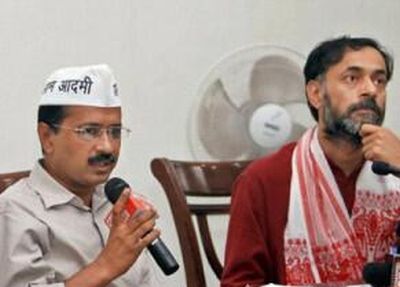 Amidst rumblings of a crisis within AAP, a letter by its internal Lokpal has pointed to the growth of two camps within the top leadership of the party due to an "abject breakdown in communication and mutual trust" and said it needs to make efforts to address criticisms over inner-party democracy.
Amidst rumblings of a crisis within AAP, a letter by its internal Lokpal has pointed to the growth of two camps within the top leadership of the party due to an "abject breakdown in communication and mutual trust" and said it needs to make efforts to address criticisms over inner-party democracy.
With sources saying that differences have cropped up between senior AAP members, especially over the selection of candidates for the Delhi Assembly polls, the letter recommended that any criticism of inner-party democracy needed to be dealt with by an independent group which carries out an internal audit.
In the letter written ahead of its National Executive meet last week, Admiral Ramdas, a former Navy chief and the party's internal Lokpal, also said that AAP must make efforts to become a genuinely gender-sensitive party as neither its PAC nor the Delhi government led by it has any woman members.
"During the past six to eight months, there has been an abject breakdown in communications and mutual trust amongst the topmost leadership of the party. This has in my view led to the growth of two camps within the party and loose talk about conspiracies.
"This is unacceptable and shows that we are no different from any of the parties whom we criticise so vocally. I sincerely urge the entire leadership of the party... to stop listening to rumours and to discourage colleagues... who continually bring negative feedback about each other," Ramdas said in the letter.
Sources said that two senior AAP leaders and members of its all-powerful Political Affairs Committee, Yogendra Yadav and Prashant Bhushan, were unhappy with candidate selection. They also said that neither was the duo in favour of the party's decision to not contest Haryana elections last year.
The letter says there was a crisis situation just ahead of Delhi elections over issues raised by Bhushan who, it claims, also threatened to resign if his concerns were not addressed.
"In end December, 2014, there was a crisis situation brought about by Bhushan's unhappiness with candidate selection and the decision-making processes. If not addressed, he said he would be forced to resign from the party and go public.
"To contain this, a special meeting was called in Delhi on January 3-4, 2015, where a decision was taken to refer the issue to the AAP Lokpal, assisted by a specially selected team," the letter said.
AAP sources have said that Arvind Kejriwal had tendered his resignation as the party's national convener during the national executive meet earlier this week, but the move was vehemently opposed by members.
The sources said that Kejriwal was upset after a section of party leaders raised the issue of him playing the dual role of Delhi Chief Minister and the party's convener. Kejriwal is believed to have demanded more freedom to run the party.
In his letter, Ramdas said AAP needs to make efforts to address criticisms over its inner-party democracy. In the past, leaders like Shazia Ilmi have quit the party citing lack of inner party democracy.
"There has been criticism within the party regarding decision-making and inner-party democracy.”
"This needs to be further analysed by an independent group who should carry out an internal audit and make suitable recommendations in keeping with the constitution and the high standards of probity and ethics that we have charted for ourselves," the letter added.
Ramdas also said that AAP must make efforts to genuinely become a gender-sensitive party.
"We need to make much efforts in the direction of becoming a genuinely gender-sensitive party which will do far more than pay lip service to women's empowerment and ensure that we work to improve women's visibility and participation at all levels.”
"I personally find it difficult to defend AAP against accusations of being mainly a 'boys' club', especially when we were not able to have even one woman in our team of ministers! Women's empowerment and justice has to go deeper and farther than mere security alone," Ramdas said.
He also criticised the party for neglecting and taking its volunteers for granted.
After the Lok Sabha debacle, a splinter group called AAP Volunteers' Vichar Manch was formed, raising issues related to the party. The group was later expelled.
"Volunteers are our lifeline. We neglected and took for granted our volunteers and their commitment, especially after the general elections in 2014.
"This may well have been one of the contributory factors for the emergence of AVAM. We need to learn the right lessons from this experience and put in place robust mechanisms and people to handle this resource," Ramdas said.











 © 2025
© 2025